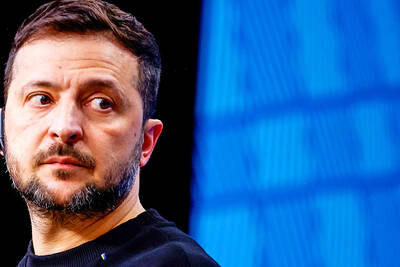Russian liberals voiced outrage at a “scandalous” restoration in which an inscription praising former Soviet dictator Joseph Stalin was returned to a Moscow metro station on Thursday.
The outcry came after officials unveiled a restored entry hall to Kurskaya metro station in central Moscow featuring all the details of the structure’s original 1950 appearance — including the slogan lauding Stalin.
“Stalin raised us to be loyal to the nation, inspired us to labor and great deeds,” says the inscription, which is taken from an early version of the Soviet national anthem.
Liberal politicians and human rights activists say the inscription glorifies a dictator responsible for the death and imprisonment of millions in the Soviet Union’s notorious gulag prison system.
“This is scandalous … Stalinism meant a monstrous genocide committed against the people of the USSR,” said Moscow city lawmaker Sergei Mitrokhin, a leader of the liberal Yabloko party.
Mitrokhin also linked the restoration to what he described as a sinister campaign by the current Russian government to improve Stalin’s image and downplay his crimes in a bid to boost patriotic feelings.
Under the presidency of Vladimir Putin, Russia approved a school history textbook that praised Stalin as an effective manager and brought back the Stalin-era national anthem, albeit with new words.
“The positive image of Stalin is being revived by state propaganda and in school books,” Mitrokhin said.
“We will demand that this shameful description be removed,” said Lyudmila Alexeyeva, head of the Moscow Helsinki Group and one of Russia’s best-known human rights activists.
Officials say they were merely being faithful to the original design of the metro — which is renowned for its artwork — and not trying to revive the Stalin personality cult.
Muscovites can now see “precisely the same entry hall that their fathers and grandfathers saw in 1950,” metro chief Dmitry Gayev said at the hall’s opening ceremony on Tuesday, quoted by the Vremya Novostei newspaper.
Gayev noted that the original entry hall featured a Stalin statue, but that it had disappeared and had not been restored.
The Stalin slogan had not been seen for nearly half a century, having been removed in the 1960s during Soviet leader Nikita Khrushchev’s de-Stalinization campaign and replaced with a slogan praising Bolshevik leader Vladimir Lenin.
Many of the grander stations in the Moscow metro were built in the 1930s and 1940s and contain artworks praising the Communist system, such as mosaics of Karl Marx and statues of burly proletarians and peasants.
Nowadays, few commuters rushing through the metro every day in capitalist Moscow pay attention to these artworks, although they are an object of fascination for Western tourists.
Some Russians praised the decision to restore the Stalin slogan, including Roy Medvedev, a well-known historian of the Soviet era.
“This station needed to be restored, and how else can you do it?” Medvedev said in an interview with Echo of Moscow radio, calling the decision “appropriate.”
“There are many such traces of Stalin in Moscow,” he said.
Coincidentally, the author of the controversial slogan, poet Sergei Mikhalkov, died on Thursday at age 96.

BLOODSHED: North Koreans take extreme measures to avoid being taken prisoner and sometimes execute their own forces, Ukrainian President Volodymyr Zelenskiy said Ukrainian President Volodymyr Zelenskiy on Saturday said that Russian and North Korean forces sustained heavy losses in fighting in Russia’s southern Kursk region. Ukrainian and Western assessments say that about 11,000 North Korean troops are deployed in the Kursk region, where Ukrainian forces occupy swathes of territory after staging a mass cross-border incursion in August last year. In his nightly video address, Zelenskiy quoted a report from Ukrainian Commander-in-Chief Oleksandr Syrskyi as saying that the battles had taken place near the village of Makhnovka, not far from the Ukrainian border. “In battles yesterday and today near just one village, Makhnovka,

The foreign ministers of Germany, France and Poland on Tuesday expressed concern about “the political crisis” in Georgia, two days after Mikheil Kavelashvili was formally inaugurated as president of the South Caucasus nation, cementing the ruling party’s grip in what the opposition calls a blow to the country’s EU aspirations and a victory for former imperial ruler Russia. “We strongly condemn last week’s violence against peaceful protesters, media and opposition leaders, and recall Georgian authorities’ responsibility to respect human rights and protect fundamental freedoms, including the freedom to assembly and media freedom,” the three ministers wrote in a joint statement. In reaction

BARRIER BLAME: An aviation expert questioned the location of a solid wall past the end of the runway, saying that it was ‘very bad luck for this particular airplane’ A team of US investigators, including representatives from Boeing, on Tuesday examined the site of a plane crash that killed 179 people in South Korea, while authorities were conducting safety inspections on all Boeing 737-800 aircraft operated by the country’s airlines. All but two of the 181 people aboard the Boeing 737-800 operated by South Korean budget airline Jeju Air died in Sunday’s crash. Video showed the aircraft, without its landing gear deployed, crash-landed on its belly and overshoot a runaway at Muan International Airport before it slammed into a barrier and burst into flames. The plane was seen having engine trouble.

REVELRY ON HOLD: Students marched in Belgrade amid New Year’s events, saying that ‘there is nothing to celebrate’ after the train station tragedy killed 15 Thousands of students marched in Belgrade and two other Serbian cities during a New Year’s Eve protest that went into yesterday, demanding accountability over the fatal collapse of a train station roof in November. The incident in the city of Novi Sad occurred on Nov. 1 at a newly renovated train facility, killing 14 people — aged six to 74 — at the scene, while a 15th person died in hospital weeks later. Public outrage over the tragedy has sparked nationwide protests, with many blaming the deaths on corruption and inadequate oversight of construction projects. In Belgrade, university students marched through the capital